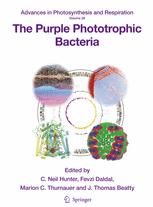

Most ebook files are in PDF format, so you can easily read them using various software such as Foxit Reader or directly on the Google Chrome browser.
Some ebook files are released by publishers in other formats such as .awz, .mobi, .epub, .fb2, etc. You may need to install specific software to read these formats on mobile/PC, such as Calibre.
Please read the tutorial at this link: https://ebookbell.com/faq
We offer FREE conversion to the popular formats you request; however, this may take some time. Therefore, right after payment, please email us, and we will try to provide the service as quickly as possible.
For some exceptional file formats or broken links (if any), please refrain from opening any disputes. Instead, email us first, and we will try to assist within a maximum of 6 hours.
EbookBell Team

0.0
0 reviewsThe Purple Phototrophic Bacteria is a comprehensive survey of all aspects of these fascinating bacteria, the metabolically most versatile organisms on Earth. This volume is organized into the following sections: Physiology, Evolution and Ecology; Biosynthesis of Pigments, Cofactors and Lipids; Antenna Complexes: Structure, Function and Organization; Reaction Center Structure and Function; Cyclic Electron Transfer Components and Energy Coupling Reactions; Metabolic Processes; Genomics, Regulation and Signaling; and New Applications and Techniques. This book is a compilation of 48 authoritative chapters, written by leading experts who highlight the huge progress made in spectroscopic, structural and genetic studies of these bacteria since 1995, when the last book on this topic was published i.e.Anoxygenic Photosynthetic Bacteria, Volume 2 in the Series, edited by Robert E. Blankenship, Michael T. Madigan and Carl E. Bauer. This new volume is similarly intended to be the definitive text on these bacteria for many years to come, and it will be a valuable resource for experienced researchers, doctoral & masters students, as well as advanced undergraduates in the fields of ecology, microbiology, biochemistry, biophysics, integrative biology, and molecular & cell biology. Scientists interested in future applications of these bacteria which could harness their potential for nanotechnology, solar energy research, bioremediation, or as cell factories, will also find this book useful.